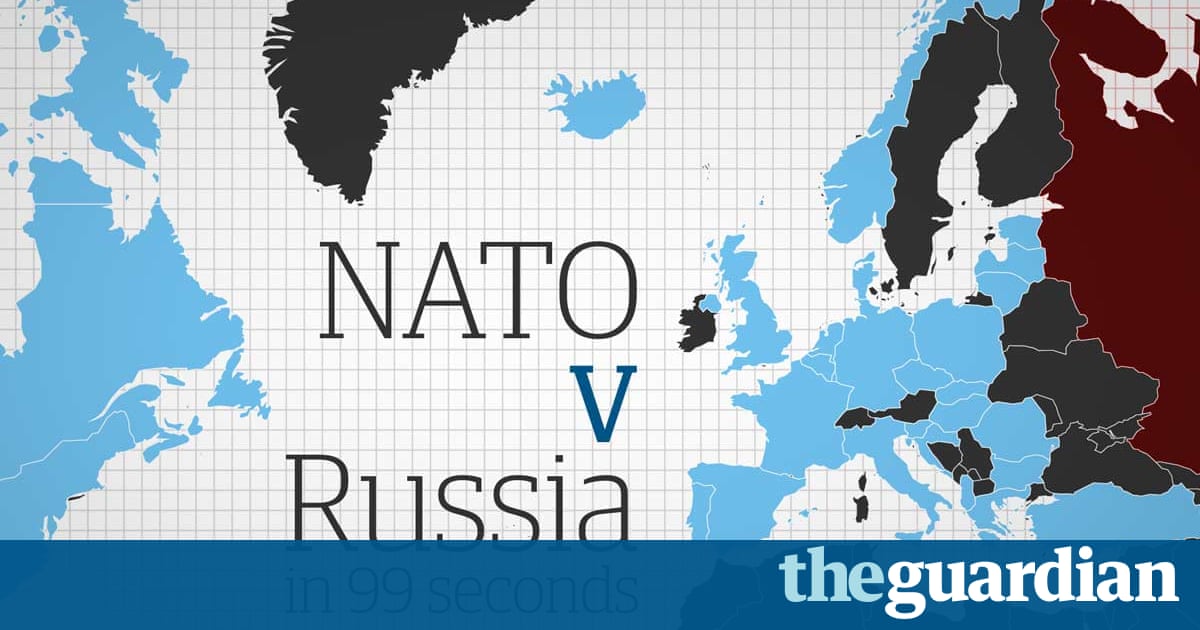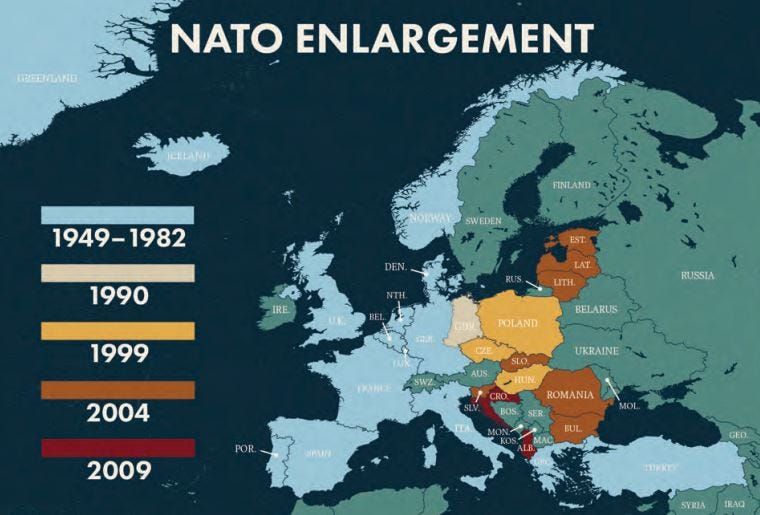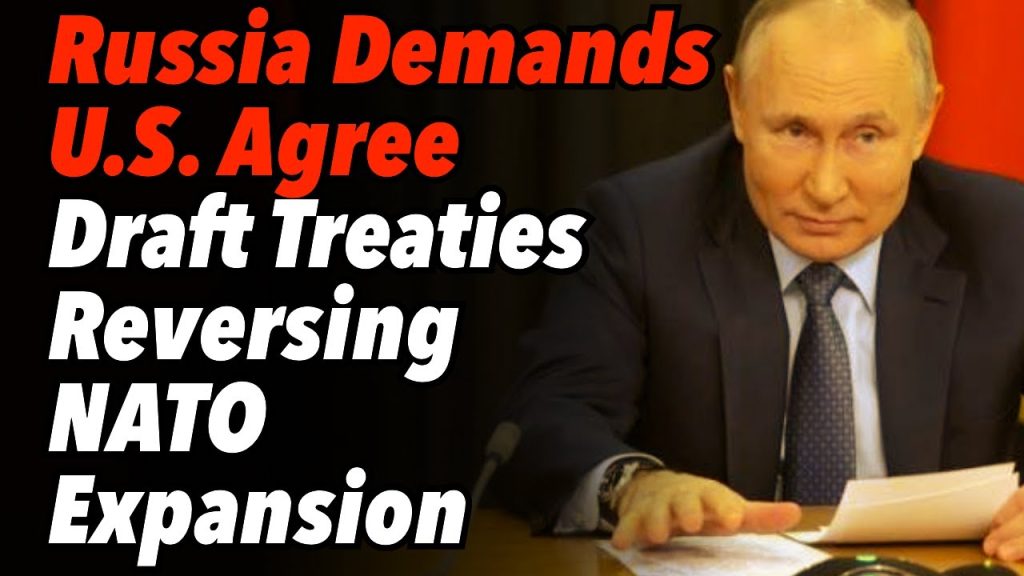
Russia Calls on US to Stop NATO’s
Eastward Expansion in Draft Security Treaty
TASS
MOSCOW (December 17, 2021) — Russian Foreign Ministry published a draft agreement on guarantees of security between Russia and the United States Friday. The document includes eight articles and covers the main aspects of mutual guarantees of security between Moscow and Washington.
The document reflects the calls, repeatedly voiced by Moscow in the past, and offers a solution to the accumulated problems and threats, including those that emerged after Washington withdrew from the Intermediate-Range Nuclear Forces (INF) Treaty.
First and foremost, the document outlines the principles of indivisible and equal security, and non-threatening of each other’s security. To this extent, the document includes the following points: rejection of actions and events that affect the other side’s security, non-participation in such events and refraining from supporting them. Besides, the draft agreement mentions the rejection of security measures — be it individual or within and international organization, military alliance or coalition — that could undermine the base security interests of the other side.

Draft agreement outlines the principles
of indivisible and equal security,
and non-threatening coexistence
NATO Eastward Expansion
“The United States of America shall take measures to prevent further eastward expansion of the North Atlantic Treaty Organization (NATO) and deny accession to the Alliance to the former USSR republics,” the treaty says.
Besides, the Russian draft stipulates US’ obligation not to establish military bases in former Soviet states that are not NATO members, not to use their infrastructure to carry out any military activity, and not to develop bilateral military cooperation with them.
According to the document, the sides will refrain from using other states’ territories in order to prepare or carry out an armed attack against each other or other actions that affect the other side’s base security interests.
Deployment of Weapons and Forces
Moscow offers Washington to refrain from deploying its armed forces and weapons, including within international organizations, military alliances and coalitions, in regions, where such deployment could be viewed as a threat to the other side’s security, except deployment on one’s national territory.
“The Parties shall refrain from flying heavy bombers equipped for nuclear or non-nuclear armaments or deploying surface warships of any type, including in the framework of international organizations, military alliances or coalitions, in the areas outside national airspace and national territorial waters respectively, from where they can attack targets in the territory of the other Party,” the document reads.
Russia also proposes maintaining dialogue and cooperating on improvement of mechanisms of prevention of incidents in international water and air space, including negotiation of the maximum approach distance between military ships and planes.
A separate article is dedicated to intermediate-and shorter-range missiles: “the Parties vow not to deploy ground-launched intermediate-range and shorter-range missiles outside their national territories, as well as in the areas of their national territories, from which such weapons can attack targets in the national territory of the other Party.”
Nuclear Weapons
The treaty also touches upon matters of nuclear weapons.
“The Parties shall refrain from deploying nuclear weapons outside their national territories and return such weapons already deployed outside their national territories at the time of the entry into force of the Treaty to their national territories. The Parties shall eliminate all existing infrastructure for deployment of nuclear weapons outside their national territories,” the draft treaty says.
Besides, the document also mentions the training of non-nuclear powers’ military staff on using nuclear weapons.
“The Parties shall not train military and civilian personnel from non-nuclear countries to use nuclear weapons. The Parties shall not conduct exercises or training for general-purpose forces, that include scenarios involving the use of nuclear weapons,” the document reads.
Moscow’s Proposals Aim to Prevent
Russia, NATO from “Crossing Red Line”

MOSCOW (December 18. 2021) — Russia and NATO have reached “the moment of truth” in their relations and Moscow is seeking to defuse tensions with its proposals for security guarantees, Russian Deputy Foreign Minister Alexander Grushko said on Saturday.
“The moment of truth has come,” he said on Solovyov Live YouTube channel. “We have reached a red line and our proposals aim to pull us away from this red line and start a normal dialogue that will put security interests at the forefront.”
“We in a very clear manner have defined the way forward to achieve that,” he went on to say.
NATO has been violating earlier agreements by stationing significant combat capabilities on the territory of new members of the alliance and deploying or creating infrastructure to deploy nuclear weapons there, Grushko said. That has prompted Moscow to make proposals that would remove any misconceptions by using more definite terms.
NATO’s talk about a threat from the east is the only reason holding the alliance together, Grushko stressed.
“It’s very dangerous,” he said.
NATO, he said, lives in a fantasy world that doesn’t have anything to do with security in Europe. All activities by NATO seek only to keep the alliance alive, he said.
Russia in Friday released draft agreements titled the Treaty Between the US and Russia on Security Guarantees and On Measures to Ensure the Security of the Russian Federation and Member States of the North Atlantic Treaty Organization. The proposals were handed over to a US representative at a meeting at the Russian Foreign Ministry on December 15.
Russian President Vladimir Putin earlier called on NATO to start substantive talks to give Russia reliable and long-term security guarantees. The guarantees will need to be legally binding because, Putin said, the West had walked back on their previous verbal commitments.
Kremlin Spokesman Dmitry Peskov said that Kremlin Aide Yury Ushakov told Sullivan that Russia was ready for an immediate start of the talks about the proposed agreements on security guarantees. Russia would be represented in the talks by Deputy Foreign Minister Sergey Ryabkov.
NATO to Face ‘Military-technical Alternative’
If It Rejects Russian Proposals

MOSCOW (December 18, 2021) — NATO should take Russian proposals for security guarantees seriously or face a “military-technical alternative,” Russian Deputy Foreign Minister Alexander Grushko said on Solovyov Live YouTube channel on Saturday.
“They have two choices,” he said. The options are either “to take seriously what we have put on the table or face a military-technical alternative,” the diplomat said.
Grushko said Western diplomats told him the West made a grave mistake when Russia was “forgiven” for defending South Ossetia from Georgia in 2008. The diplomats said, according to Grushko, that Russia “smelled blood.”
That’s one of the reasons Russia has come up with its recent proposals for security guarantees and made them widely available, he said.
“That we have enough technical capabilities to reliable ensure our military security with all means available is a fact that’s acknowledged by our partners,” Grushko said. “Because that’s what NATO is doing now: They are trying to neutralize these advantages of ours.”
Russia is signaling it prefers diplomacy, he said.
“We are making clear that we are ready to talk about switching over from a military or a military-technical scenario to a political process” that will strengthen the security of all countries in the area of the OCSE, Euro-Atlantic and Eurasia, Grushko said.
Russia in Friday released draft agreements titled the Treaty Between the US and Russia on Security Guarantees and On Measures to Ensure the Security of the Russian Federation and Member States of the North Atlantic Treaty Organization. The proposals were handed over to a US representative at a meeting at the Russian Foreign Ministry on December 15.
Russian President Vladimir Putin earlier called on NATO to start substantive talks to give Russia reliable and long-term security guarantees. The guarantees will need to be legally binding because, Putin said, the West had walked back on their previous verbal commitments.
Kremlin Spokesman Dmitry Peskov said that Kremlin Aide Yury Ushakov told Sullivan that Russia was ready for an immediate start of the talks about the proposed agreements on security guarantees. Russia would be represented in the talks by Deputy Foreign Minister Sergey Ryabkov.
Posted in accordance with Title 17, Section 107, US Code, for noncommercial, educational purposes.